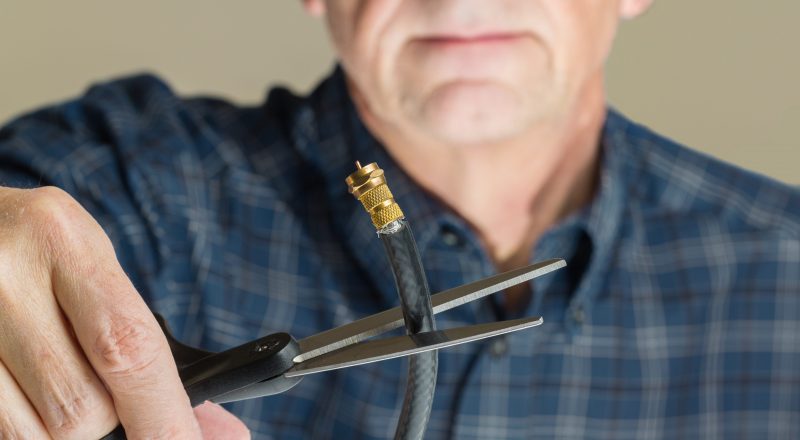 There once again seems to be a wave of anti-cord cutting posts. This time instead of complaining you can’t really cut the cord they are trying to convince you that you will pay more than you would for cable TV.
There once again seems to be a wave of anti-cord cutting posts. This time instead of complaining you can’t really cut the cord they are trying to convince you that you will pay more than you would for cable TV.
The most recent story like this is from Refinery29. So let’s break down Refinery29’s argument and show how the article got cord cutting wrong.
Savings
Right from Refinery29 own story you are shown how you can easily save $60 a month and $720 a year as a cord cutter. “After paying for Amazon, Hulu, Netflix, and HBO Now, a user would still be paying about $40.00 a month. Granted, that’s cheaper than the close to $100.00 one might pay for cable.”
We searched the entire story and failed to find a single breakdown or example of a cord cutter who was paying more than the current average of $100 a month for cable TV.
However, there are stories and studies from well-respected sources, such as The Wall Street Journal, that clearly show cord cutters on average save over $1,000 a year.
So I would have to say Refinery29’s story proved that yes cord cutting can save you money.
Buying Equipment
Part of the Refinery29 claims that cord cutting costs more money is the need to buy a streaming player. “…and that’s without factoring in the (albeit onetime) cost of a digital media player, such as a streaming media player like Roku or Apple TV.)
You complain about having to buy a streaming player but ignore the monthly cost of renting a cable TV box. And many pay-TV providers charge $10 a month for a DVR or, for example, Comcast charges $5 for a non-DVR box. The average cable TV subscriber pays $232 a year in box rental fees. Over a 2-year contract that is $464 in just box rental fees.
However, for as low as $30 for a Roku or $39 for Fire TV Stick you can buy a streaming device. This is a onetime fee that costs far less than cable TV and is something you can own for life.
Refinery 29’s Numbers
The Refinery29 story stated, “According to the GFK study, more than a third of all households subscribe to a TV streaming service: 31% to Netflix, 16% to Amazon Prime Video, and 7% to Hulu, with some overlap.”
However, that is not what the GFK study says. The title of the study linked to in the story reads, “One-Quarter of US Households Live Without Cable, Satellite TV Reception.” At no point in the GFK study can we find numbers that lineup with the ones used in the Refinery29 post.
A recent study from June 27, 2016, shows that half of US households have a streaming TV service. This study comes from Nielson, a widely respected and known source.
Sorry, Refinery29, You Failed To Give Any Supporting Evidence
The main claim of the author of the story is “What’s more: As the industry becomes more and more fragmented, the cost to continue watching all the shows on all the services cord cutters pay for right now could rise, causing them to pay even more than they did before. In the future, consumers may return to cable or bundling packages yet again to save money.”
That statement is completely lacking any supporting evidence. Yes, cord cutters have a ton of options but that does not mean you need to subscribe to all of them. Unlike with traditional pay-TV cord cutters have freedom to pick and choose services. Everyone is different with different interests and likes. Unlike cable TV that tries to treat all subscribers the same, cord cutters can pick and choose what they want.
Finally, Everything I said was Ignored
Yes, I was interviewed for this story and my interview was taken out of context. Even worse, when the story was first posted it said I owned CordCutting.net a site someone owns but is currently has a holding page by GoDaddy. I had to contact Refinery29 to get that changed.
During my interview with the author I gave studies and examples to support my evidence that cord cutting is cheaper. I clearly laid out why I became a cord cutter. (Which is what I was told Refinery29 wanted to talk to me about when you asked for an interview.) However, that was ignore this was the quote they used from my interview.
“Cord-cutting is not meant to be a one-for-one replacement for cable,” Luke Bouma of cordcuttersnews.com told me. “If you signed up for Sling, HBO Now, Netflix, and Hulu, you’ve got a lot of redundancy there, and you’ll probably end up paying more than you would just for cable.”
I will be the first to say that cord cutting is not for everyone, but the way my quotation was used and ignored everything I was talking about made it sound like I was anti-cord cutting. It was also said in reply to a question about cord cutters who over pay.
As always my goal with Cord Cutters News is to give an honest look at cord cutting. When we find posts like this one we will always do out best to give the other side.
Please follow us on Facebook and Twitter for more news, tips, and reviews.
Need cord cutting tech support? Join our new Cord Cutting Tech Support Facebook Group for help.

